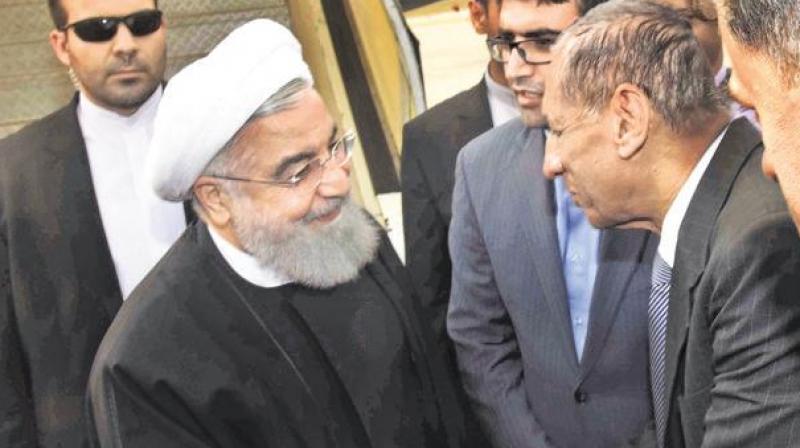Iran, India slam states aiding terror
Iran and India have a common stance on confronting terrorism and extremism, President Rouhani said.

New Delhi: Visiting Iranian President Hassan Rouhani held detailed talks with Prime Minister Narendra Modi on Saturday following which India and Iran signed nine pacts including one for a lease contract as part of the first phase of the Chabahar port development which will lead to a strategic sea-land route linking India with Iran, Afghanistan and Central Asia. Importantly, the two countries condemned terrorism and said — in what is being seen as a veiled reference towards Pakistan — that “States that aid, abet and directly or indirectly support terrorism should be condemned.”
During the talks between the two leaders, India is also believed to have briefed Iran about the role of Pakistan-sponsored terrorism in attempts to destabilise the situation in Kashmir. Afghanistan was another major issue discussed during talks, with both India and Iran opposed to the attempts of the Taliban to destabilise the situation in Afghanistan. “Iran and India have a common stance on confronting terrorism and extremism,” President Rouhani said. Rouhani said Iran was “fully ready” to intensify cooperation in the areas of energy, particularly oil, gas and petrochemicals. In strengthening ties with oil-rich Iran, India is attempting to balance out the strong ties it has on the other hand with both the US and Israel.
Welcoming President Rouhani, PM Modi hailed the Iranian President's leadership on establishment of the Chabahar port which PM Modi described as the "golden gateway" of central Asia that will be of immense benefit to landlocked Afghanistan. India also "conveyed its readiness to support the development of the Chabahar-Zahedan Rail line" that will help in further transit of goods inside Iran towards its border with Afghanistan. India is looking to completely take over the operations of the strategically-located Chabahar port which is expected to offer stiff competition to the Gwadar port in Pakistan's restive Balochistan province that is being developed with Chinese help.
Chabahar will also end Afghan dependence on Pakistan for connectivity since goods can now travel from India to Iran, Afghanistan and Central Asia and vice-versa through Chabahar. One of the important pacts signed was the "Lease Contract for Shahid Beheshti Port- Phase 1 of Chabahar" that will envisage "leasing of a part of the area of the multipurpose and container Terminal for a term of one and half solar year (18 months) to take over operation of existing port facilities." Both sides also "agreed to continue and increase the pace of negotiation for reaching appropriate results on energy cooperation, including Farzad B gas field".
With India now allowing investment in Indian Rupees in Iran, "permission for the Iranian Pasargadbank to open a branch in India" is "under advance consideration". Both countries also "agreed to set up a Joint Committee of officials to examine feasible options, including Rupee-Rial Arrangement, Asian Clearing Union mechanism to establish functional payment channels". After the talks, "it was agreed that India would grant e-visa facility for the Iranian nationals and Iran would grant e-visa facility to the Indian nationals". The signing of visa waiver agreement for holders of diplomatic passports was also a step in this direction.
Another pact was the "Agreement for the Avoidance of Double Taxation and the Prevention of Fiscal Evasion with respect to taxes on Income" to "avoid burden of double taxation between the two countries in order to promote flow of investment and services". Other pacts included one on "Exchange of Instrument of Ratification of Extradition Treaty" that "brings into effect the Extradition Treaty signed between India and Iran in 2008', and others in the fields of health, medicine and agriculture.
Both sides also "expressed interest in enhancing cooperation possibilities in maritime domain" and "it was agreed to hold dialogue to look into measures for cooperation in defence sphere, including port calls by naval ships, training and regular exchanges of defence delegations". On Chabahar, the Joint Statement said, "The successful inauguration of the Phase-1 of Chabahar Port in early December 2017; the ratification of the Trilateral Agreement between India, Iran and Afghanistan on Establishment of International Transport and Transit Corridor by all sides; and the successful shipment of wheat assistance from India to Afghanistan through Chabahar Port have opened a new gateway to and from Afghanistan, Central Asia and beyond. Both sides reiterated their commitment for early and full operationalisation of ShahidBeheshti Port at Chabahar."
On combating terrorism, the Joint Statement read, "Recognising the challenges of terrorism and ideologies of violent extremism, the two Leaders reiterated their strong commitment to combat terrorism in all its forms and manifestations ... They stressed that terrorism cannot and should not be associated with any religion, nationality or ethnic group. They urged an immediate end to all support and sanctuaries enjoyed by terrorist groups and individuals and were of the view that States that aid, abet and directly or indirectly support terrorism should be condemned. They called on the international community to end selective or partial approaches to combating terrorism .... ."
On Afghanistan, the two countries said, "Both sides stressed that the interests of peace and stability in the region are best served by a strong, united, prosperous, pluralistic, democratic and independent Afghanistan while supporting the National Unity Government in the country." On the cultural side, both countries also "agreed to hold the Festival of India in Iran in 2018/19; establish a Chair of Indian studies in Tehran University; organise Indology courses for Iranian diplomats by the Foreign Service Institute of India; support the Persian language courses in India".

